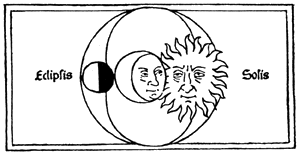|
|
The Sun-Eating Dragon Continued
This theme of science-versus-superstition
even appears in the world-renowned comic-book
adventures of Tintin, the boy reporter created by Hergé.
In
Prisoners of the Sun,
Tintin and his companions have been
taken prisoner by a tribe of Incas. For their crime of accidentally
entering the Temple of the Sun, Tintin and Captain Haddock are to
be burned alive, their pyre lit by a huge magnifying glass focusing
the rays of the sun. The only dispensation the Incas give them is
that they may choose the day and hour of their death. Tintin finds
a scrap of newspaper in his pocket, and notices that a total
There May Be More to the Story All of these literary examples imply that it is foolish to be afraid of an eclipse. Their authors would agree with Bryan Brewer, who, in his book Eclipse, put the idea this way: "With advance notice of the event and a higher level of scientific understanding among people, there is no need for anyone to be frightened by what should be a marvelous experience of the beauty of nature."

But is it really superstitious to react to an eclipse with fear and wonder? Do scientists really feel no awe or amazement when the sun disappears behind the moon? Often science is portrayed as a struggle in which the discovery of facts liberates us from the tyranny of emotional reaction to experience. But a look at some other literary reactions to eclipses, and a look at the feelings of modern scientists themselves, reveals a different picture. Perhaps these people would agree with Thomas Carlyle that "The man who cannot wonder is but a pair of spectacles behind which there is no eye." |

|

|
 eclipse
is predicted a few days hence. Choosing that day and time for their
execution, Tintin then is able to halt the ceremony, shouting to
the leader of the Incas "Stay, Husker! . . . The Sun God will
not hear your prayers! O magnificent Sun, if it is thy will that
we should live, give us now a sign!" And the sun, appearing
to obey Tintin's will, begins to disappear behind the eclipse. The
Incas are terrified, and rush about in chaos. The Inca leader frees
Tintin and his friends, and they are accorded places of honor.
eclipse
is predicted a few days hence. Choosing that day and time for their
execution, Tintin then is able to halt the ceremony, shouting to
the leader of the Incas "Stay, Husker! . . . The Sun God will
not hear your prayers! O magnificent Sun, if it is thy will that
we should live, give us now a sign!" And the sun, appearing
to obey Tintin's will, begins to disappear behind the eclipse. The
Incas are terrified, and rush about in chaos. The Inca leader frees
Tintin and his friends, and they are accorded places of honor.